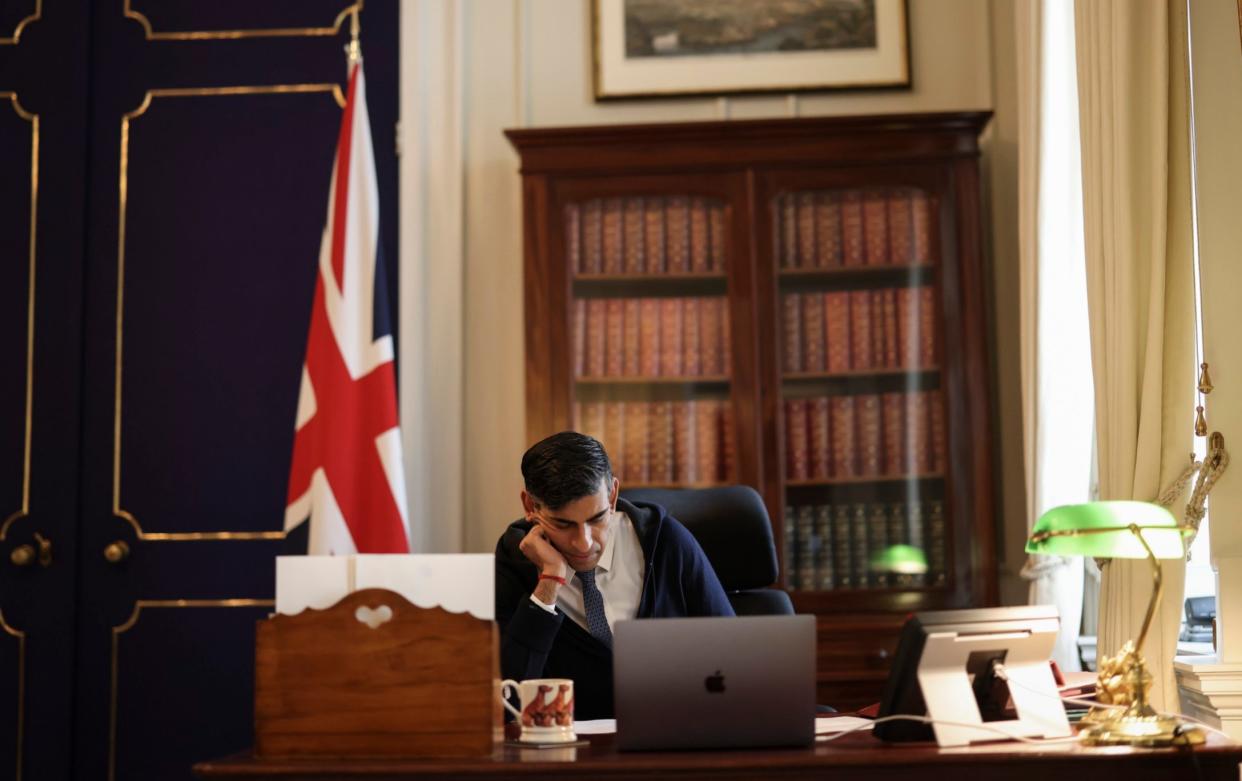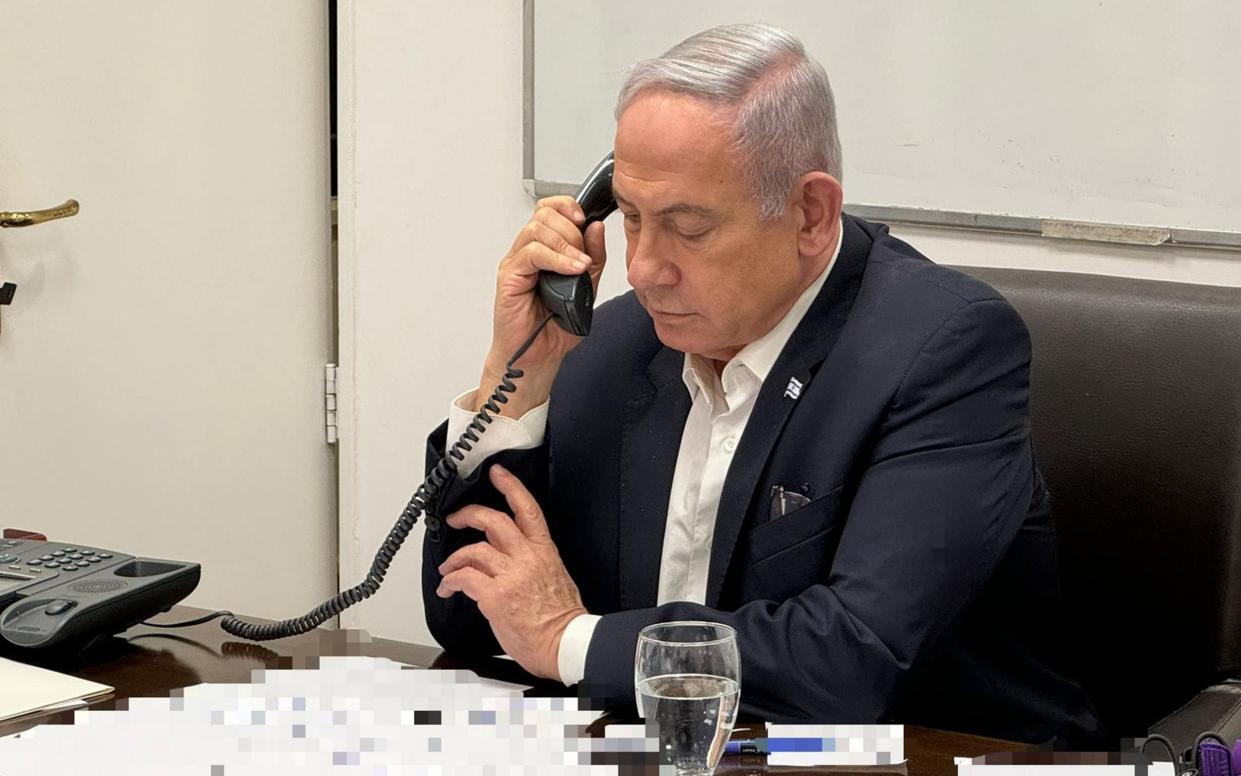Sunak warns Netanyahu a revenge attack on Iran would leave Israel ‘less secure’

Rishi Sunak has warned Benjamin Netanyahu in a phone call that launching a retaliation attack on Iran for Saturday’s strikes would leave Israel less secure.
Mr Sunak told the Israeli Prime Minister that a “significant escalation was in no one’s interest”, according to a Downing Street readout of the 30-minute call on Tuesday afternoon.
The conversation makes the Prime Minister the second world leader to talk to Mr Netanyahu since Iran’s missile and drone attack.
US president Joe Biden told Israel to call off immediate revenge in a call on Saturday night during the Iranian attack.
Mr Sunak’s call with Mr Netanyahu had been delayed by more than 24 hours, with the Israeli leader locked in war cabinet meetings.
The UK joined the US and France in helping Israel shoot down some of the 350 drones, missiles and rockets fired by Iran on Saturday night.
During the call Mr Netanyahu thanked Mr Sunak for the UK’s “rapid and robust support” for Israel in the attack, according to the read-out circulated by Number 10.
A Downing Street spokesman said: “The Prime Minister said Iran had badly miscalculated and was increasingly isolated on the global stage, with the G7 coordinating a diplomatic response.
“He stressed that significant escalation was in no one’s interest and would only deepen insecurity in the Middle East. This was a moment for calm heads to prevail.”

It is understood that Mr Sunak explicitly said on the call that Israel would become more insecure if a retaliation strike on Iran was launched.
The call is the latest attempt by the West to urge restraint on Israel after what was seen militarily as the successful intervention of Iran’s rockets.
Mr Biden reportedly told Mr Netanyahu that he would not support any counter-attack against Iran in what has been seen as having a significant impact on Israeli government thinking.
Emmanuel Macron, the French president, had not yet spoken to Mr Netanyahu when Mr Sunak had his call. He has said “we will do all we can to avoid things flaring up, escalating”.
Israeli media reported on Tuesday night that the war cabinet has agreed that any attack should be measured and take place on Iranian soil but that it cannot lead to a wider conflict with Iran.
One source told The Telegraph the cabinet has agreed that the retaliation should be “strategic but painful”.
Iran’s president told Vladimir Putin that Tehran’s strikes on Israel were limited and that it wanted to avoid further escalation in the allies’ first phone call since Sunday’s missile and drone attack.
The Russian president spoke to Ibrahim Raisi, with the Kremlin saying Russia hopes that all sides will show “reasonable restraint and prevent a new round of confrontation fraught with catastrophic consequences for the entire region”.
Earlier on Tuesday, Wang Yi, China’s foreign minister, also showed support for Iran, saying that Beijing thinks Iran can “handle the situation well and spare the region further turmoil”.
Mr Yi said China had noted Iran’s claim that its “action taken was limited and was an act of self-defence”.
The regime in Tehran is expecting a retaliation to Sunday’s unprecedented missile and drone attack on Israeli territory.
The United States believes that Israel is considering a narrow and limited strike inside Iran, US officials have said.
“But any additional move now opens up a series of other possibilities, some of which are quite frightening,” the senior official told CNN, adding that there was no guarantee that Israel would alert its ally before launching its retaliation.
Mr Sunak used the phone call to once again demand that more aid be let into Gaza, saying he was “gravely concerned about the deepening humanitarian crisis”.
The UK wanted to see a massive step change in aid access to flood Gaza with vital supplies, including Israel opening up new aid routes as quickly as possible. The Prime Minister said it was deeply disappointing that Hamas blocked a deal at the weekend that would have saved Palestinian lives and secured the safe release of hostages.
Downing Street had said that the Prime Minister was due to speak to Mr Netanyahu on Monday but it happened late afternoon on Tuesday.
Downing Street denied the UK was being “taken for granted” by Israel and suggested Mr Netanyahu’s other commitments meant a call had not been possible.
Suella Braverman
Grow a backbone and ban the IRGC
Since Tehran’s air strikes some Tory MPs have renewed calls to ban Iran’s Islamic Revolutionary Guard Corps (IRGC) as a terrorist organisation.
Senior Tories including Sir Iain Duncan Smith, the former Tory leader, and Suella Braverman, the former home secretary, have urged the Prime Minister to proscribe the group as a terrorist organisation.
But Laura Farris, the Home Office minister told LBC: “I don’t think there’s any disagreement, actually, on the principle.
“We’re not for a second defending the IRGC. We’re simply saying that maintaining that channel with Tehran at this moment in time is, at present, in our national interest.”



